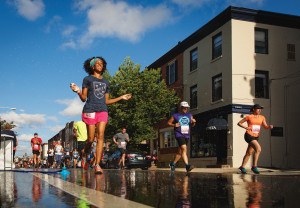Letters from Boot Camp: Finding My Fighting Face
I lost a pound and a half last week.
This would appear to be good news. It’s certainly better than gaining a pound and a half, which I can generally manage by looking at a piece of cake, never mind eating one. But the problem is when you are a big guy with a big number of pounds to lose—in other words, when you are me—and you drop weight not in big dollops but in teaspoon-sized servings, two questions immediately creep into your mind.
The first is: What if this doesn’t work?
Meaning, what if I put myself through ten weeks of this, I learn to embrace cauliflower and avoid cookies, I faithfully show up for my workouts and trudge through my spinning and burpees and push-ups and yoga stretching, and yet, for some reason, it just…doesn’t…work? What if I endure, and at the end I look like just a slightly better, slightly more rested version of the me that started, with nothing to really telegraph or reward the hell I’ve endured?
Which leads to the second question: If this isn’t going to work, why the hell aren’t we in line at the Wawa ordering a chicken salad shorti?
There are two answers. The first one, the intellectual one, is that no matter what, this is a good thing, that living healthier, learning better eating habits, pushing myself, and having the courage to almost always be the oldest and pudgiest person in any class at the work camp that is Fusion are positive, affirming steps to better holistic living. I know that. We pause here for a reading from The Book of Gavin: “We have all experienced frustration when we try to make something happen we want. At that moment we either follow the feelings of frustration, get upset and probably quit trying or we ease up, employ patience and keep going. We are not in control of anything but ourselves.”
Intellectually, that’s a no-brainer. But we do not live our lives intellectually. We live them emotionally. Which is why we who have grappled with things like emotional eating—I once had a saying posted above my desk that read, “There is nothing so terrible in life that a pint of Häagen Dazs can’t cure”—find ourselves bereft when our crutches, all readily available in your grocer’s freezer, are taken away, and what is supposed to replace them—namely, a better self-image—lags behind.
It’s not helping that I am getting mixed reactions at Fusion. The instructors have generally been wildly supportive, if a bit (justifiably) head-shaking at my bellicose grunts and, shall we say, “color commentary” as I wind my way through my workouts. And God knows I adore the Champagne Ladies for cheerleading me through those bracing 6:30 a.m. brute camps every Tuesday morning and sending encouraging group emails during the week. But now, in the midst of week four, I also get the definite feeling that there are other Fusionistas who find me silly, if not downright ridiculous. It’s not so much that they see Gavin as Jim Jones and cross-training as the Kool-Aid—though I strongly suspect some of them do—but rather the nagging feeling I get that they think I am not taking this seriously, that for me this is all a sweaty lark, a stunt meant to last until the jokes have all been wrung out along with my drenched T-shirts.
I wish. I wish I could adopt that stern poker face of determination that looks like it jumped out of a Nike commercial. But it’s not me. And I can only be me. If I try it another way, if I try to radically change who I am, I am likely to lose the honesty of this experiment, and I have to stick to that, no matter how embarrassing it is. I will say that this is rewarding, in surprising ways, not the least of which is that it had made me proud of myself in a way I have never been proud of myself before, and that is challenging myself physically. But it is also tough and relentless, and affecting stoicism and going on a shopping spree for workout clothes at Lululemon isn’t going to make it any less so. I will stay determined, even if I don’t always look or act the part. Because I have done this before.
When I was in ninth grade, my first year in a public school, I had a dual misfortune. I was the fat new kid, and I had several classes with a kid I’ll call Harry Morris. Harry was wiry and acne-scarred, with greasy hair and an even greasier disposition, and hung with the tough boys, though he never really seemed to be truly of them. For some reason he made it his mission to make my life as miserable as possible, and for the better part of that year he did, through menacing glares, intimidation, and the occasional awful epithet. I did what all fat boys in such situations do, which is put my head down, walked a bit faster, and ignore it, counting the days til June.
On the last day of school the taunting was especially egregious, and on the walk home all I could think about was, Oh my God—how am I going to survive three more years of this?
And then I had an epiphany, right there on Cottman Avenue: I don’t have to.
I went home, took money I’d saved selling water ice and pretzels at the local pool the previous summer, and got on the bus to the Roosevelt Mall. I bought a brand-new pair of sneakers, and shorts, and T-shirts. That night, I told my eldest brother, who had dabbled in boxing, that I wanted to take up the sport, and asked him if he would sign up for classes with me at the local Y.
That summer, I ran every day. A block at first, then a block and a half, until I could make it all the way around Jardel playground—a quarter mile—without stopping. In wicked heat and rain I ran, and every Monday night I went to the Y to learn how to throw a jab and a hook, how to bob and weave. By the time school started again in September I’d lost more than 30 pounds (ah, youth) and possessed a killer right cross. And so I did something I had never done before, and I have never done since: I went looking for a fight. I went looking for Harry Morris.
All summer images of Harry—furled in a ball on the schoolyard, bleeding from every orafice, pleading for mercy—had sustained me. So like an early Emily Thorne I prowled the halls of the high school, until I was able to find the homeroom he would have been in. No Harry. I went to the school office, and asked if they could tell me where I could find my old friend Harry.
“Oh, he transferred,” the secretary told me. “His father got a job out of state.”
Two years later, taller and still lanky at 17, I was walking down a hallway during my senior year when who came approaching but…Harry Morris. He looked almost the same, though his acne had mercifully worsened. I was so stunned to see him I almost couldn’t speak. He looked at me, nodded a brief, “Hey,” and kept walking. He had no idea who I was.
By then my urge to pummel him had passed: life at 17, when you are maturing and figuring out who it is you’re going to be, looks radically different than it does at 14. But I had proven something to myself, which was that while I had lost the Battle of Ninth Grade, with patience and a plan I had won the high school war.
With six-plus weeks of boot camp left, that’s a lesson worth remembering.
………….
Michael Callahan, the executive editor of Philadelphia magazine, hates working out—which is what makes this little experiment so very awesome. He blogs about his boot camp experience—the good, the bad, and everything in between—every Friday on Be Well Philly. Catch up on the series here.


